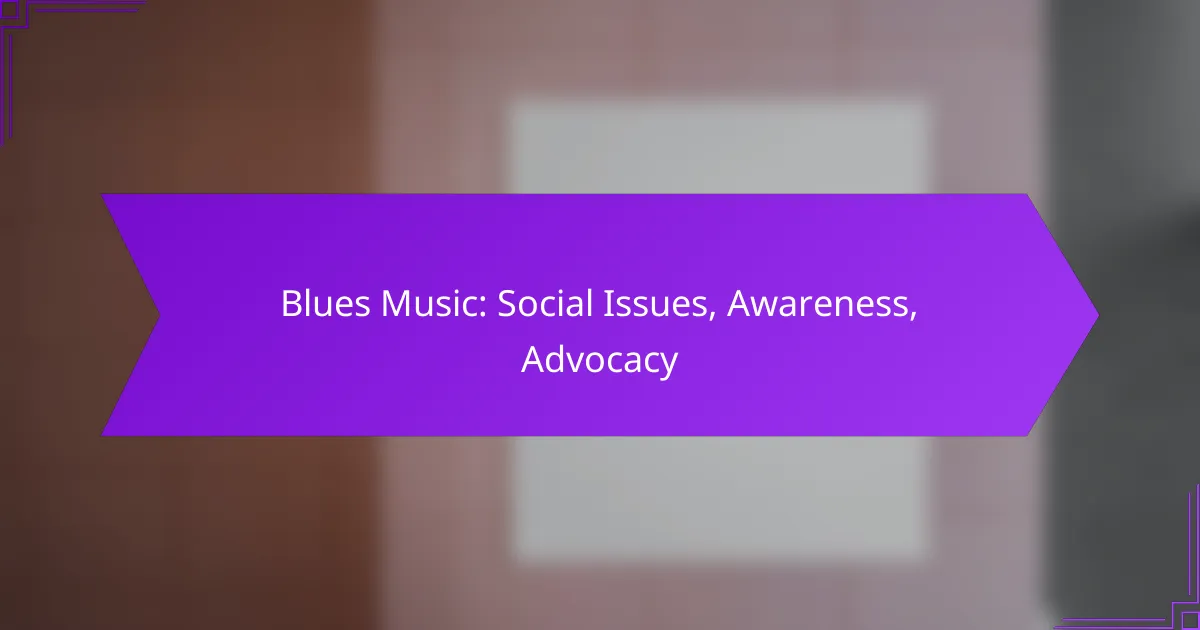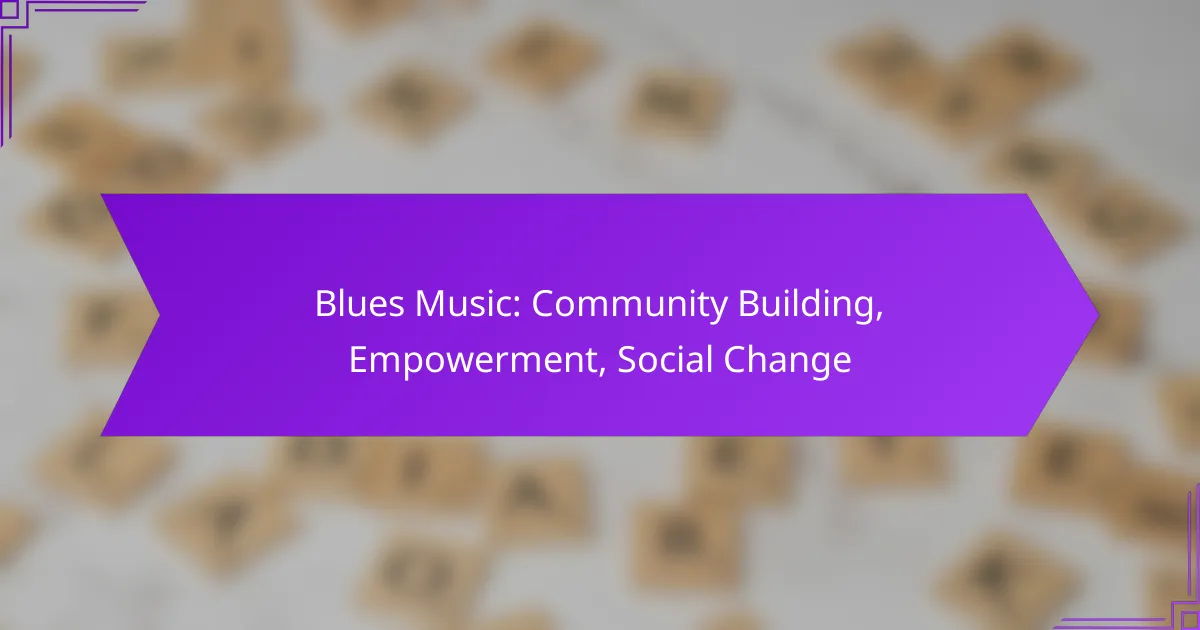Blues music serves as a vital medium for political activism in the United States, offering poignant social commentary and protest through its rich lyrical content. By addressing themes of racial inequality, social justice, and economic struggles, contemporary blues artists like Gary Clark Jr. and Shemekia Copeland continue to inspire movements for change and engage their audiences in meaningful dialogue about pressing social issues.
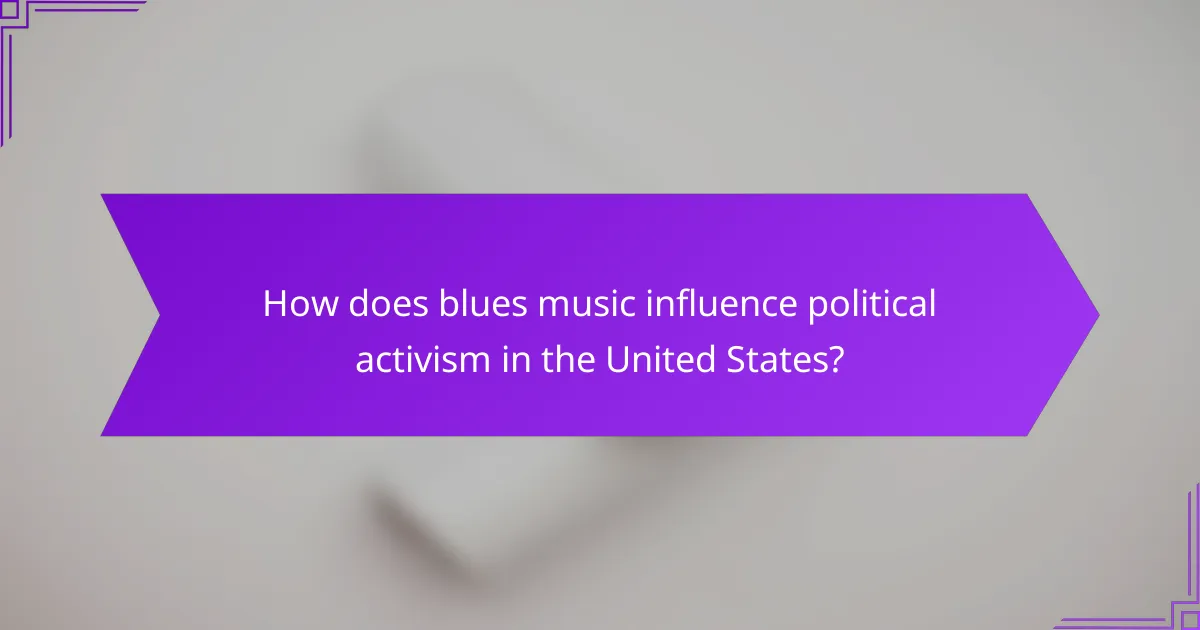
How does blues music influence political activism in the United States?
Blues music significantly influences political activism in the United States by serving as a powerful medium for social commentary and protest. Through its lyrics and cultural roots, blues articulates the struggles and aspirations of marginalized communities, inspiring movements for change.
Historical context of blues and civil rights
The blues genre emerged in the late 19th century, rooted in African American experiences, particularly in the South. It became a voice for the oppressed, addressing themes of hardship, resilience, and social injustice, which laid the groundwork for its role in the civil rights movement.
During the 1960s, blues musicians like B.B. King and Muddy Waters used their platforms to advocate for civil rights, often performing at rallies and events that highlighted the fight against racial discrimination. Their music resonated with activists and helped galvanize support for the movement.
Modern artists advocating for social change
Today, contemporary blues artists continue the tradition of using their music for activism. Musicians such as Gary Clark Jr. and Shemekia Copeland address current social issues like police brutality and systemic racism in their songs, connecting with audiences on pressing matters.
These artists often collaborate with various organizations to promote awareness and mobilize action. By integrating political messages into their performances and social media, they engage younger generations in the ongoing struggle for equality and justice.
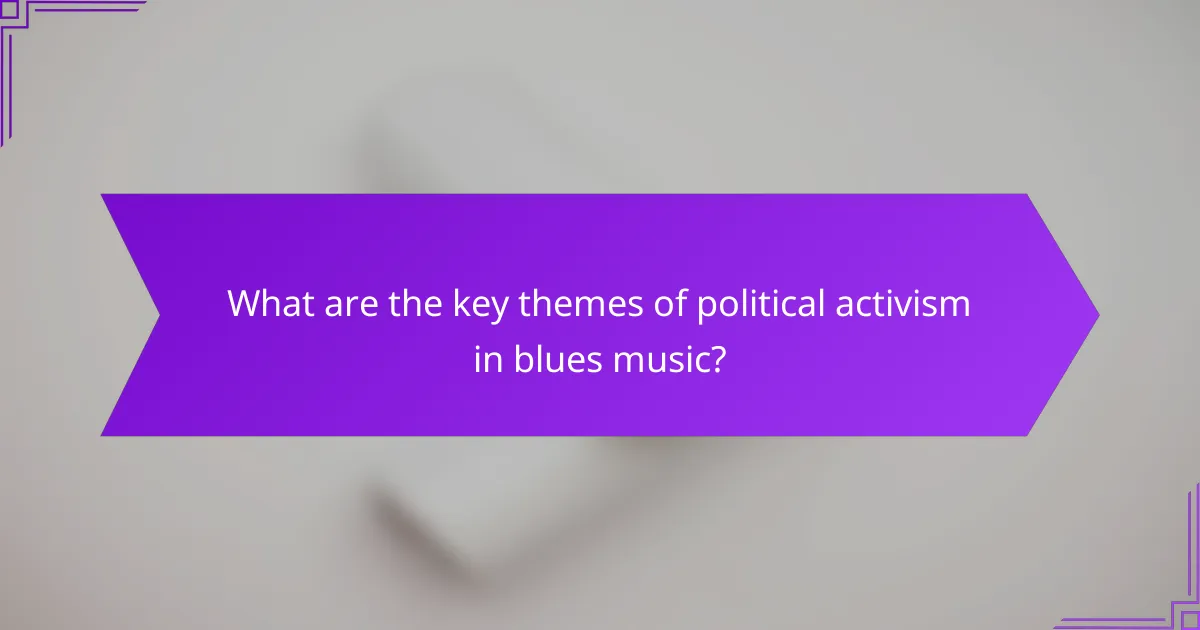
What are the key themes of political activism in blues music?
Political activism in blues music often centers around themes of racial inequality, social justice, and economic struggles. These themes reflect the historical and ongoing challenges faced by marginalized communities, making blues a powerful medium for expressing resistance and resilience.
Racial inequality and social justice
Racial inequality is a predominant theme in blues music, highlighting the systemic discrimination faced by African Americans. Artists often use their lyrics to address issues such as police brutality, civil rights, and the fight for equality, resonating with audiences who share similar experiences.
For example, songs like “Strange Fruit” powerfully depict the horrors of lynching, serving as a stark reminder of America’s racial past. Contemporary blues musicians continue this tradition, using their platforms to advocate for social justice movements like Black Lives Matter.
Economic struggles and resilience
Economic struggles are another critical theme in blues music, reflecting the hardships of working-class life. Many blues songs narrate stories of poverty, unemployment, and the fight for a better life, resonating with listeners who face similar challenges.
Artists often convey messages of resilience, emphasizing the importance of perseverance in the face of adversity. For instance, songs that discuss overcoming hardship or finding hope amidst despair serve as anthems for those navigating economic difficulties, reinforcing a sense of community and shared experience.
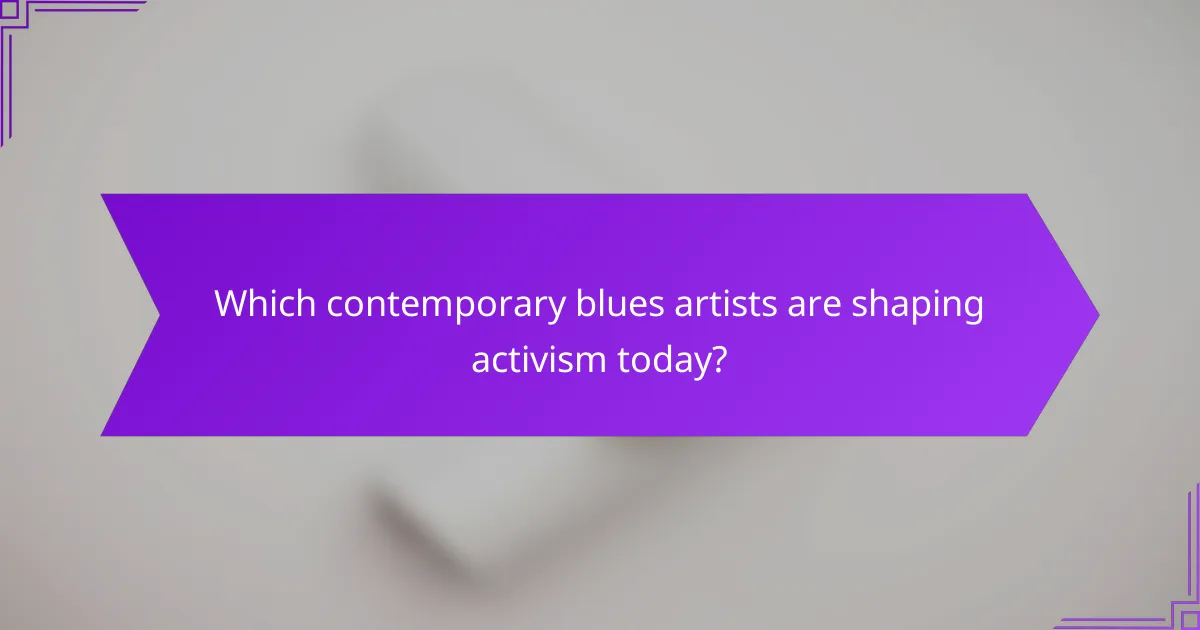
Which contemporary blues artists are shaping activism today?
Contemporary blues artists like Gary Clark Jr. and Shemekia Copeland are significantly influencing political activism through their music and public engagement. They use their platforms to address social issues, advocate for change, and inspire their audiences to take action.
Gary Clark Jr. and his advocacy
Gary Clark Jr. is known for blending blues with rock and soul, and he actively addresses social justice issues in his work. His songs often reflect themes of racial inequality and police brutality, resonating with movements like Black Lives Matter.
In addition to his music, Clark participates in various advocacy events and collaborates with organizations focused on civil rights. He encourages fans to engage in activism, emphasizing the importance of using one’s voice for change.
Shemekia Copeland’s activism
Shemekia Copeland uses her powerful voice to highlight issues such as domestic violence, racial injustice, and environmental concerns. Her lyrics often tell stories that raise awareness about these critical topics, making her music a vehicle for social commentary.
Copeland also supports various charities and initiatives, including those that empower women and promote community development. She frequently speaks at events, urging her audience to become involved in activism and support marginalized communities.
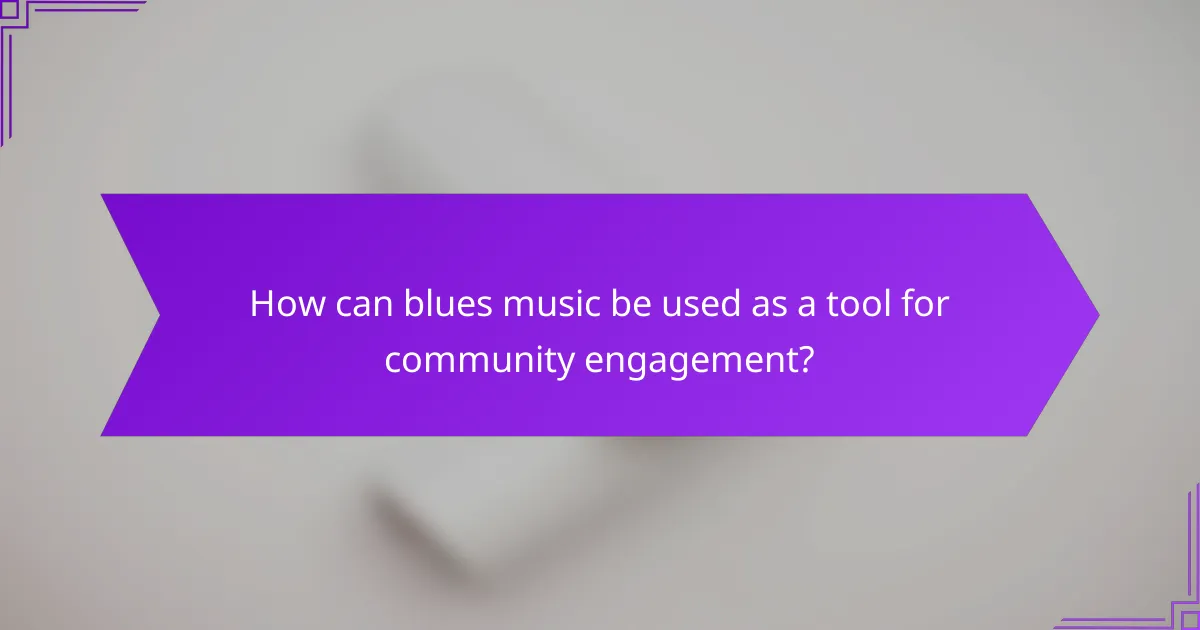
How can blues music be used as a tool for community engagement?
Blues music can serve as a powerful tool for community engagement by fostering connections among individuals and promoting cultural awareness. Through various activities, it encourages participation and collaboration, ultimately strengthening community bonds.
Organizing local events and festivals
Local events and festivals centered around blues music can draw community members together, creating a shared experience that promotes unity. These gatherings can feature live performances, food vendors, and art displays, providing a platform for local artists and businesses.
To successfully organize such events, consider collaborating with local musicians, sponsors, and community organizations. Setting a budget, securing permits, and promoting the event through social media and local channels are essential steps to ensure a well-attended gathering.
Workshops and educational programs
Workshops and educational programs focused on blues music can engage community members by teaching them about the genre’s history, instruments, and songwriting techniques. These programs can be tailored for various age groups, making them accessible to everyone from children to adults.
When planning workshops, consider partnering with local schools, music stores, or community centers. Offering free or low-cost sessions can encourage participation, while providing resources such as instruments or instructional materials can enhance the learning experience.
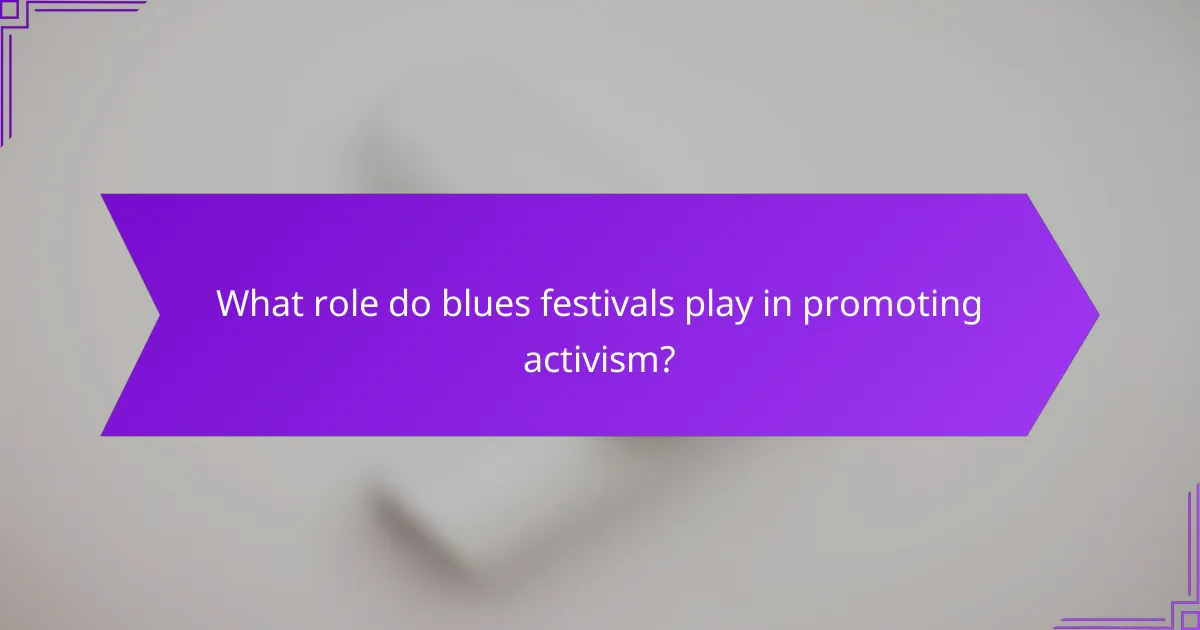
What role do blues festivals play in promoting activism?
Blues festivals serve as vital platforms for promoting activism by raising awareness of social issues and fostering community engagement. Through music, they connect audiences with important causes, encouraging dialogue and action.
Highlighting social issues through performances
Blues festivals often feature performances that address pressing social issues such as racial inequality, economic hardship, and civil rights. Artists use their music to tell stories that resonate with audiences, making complex topics more accessible and relatable.
For example, songs that reflect on historical injustices or current struggles can spark conversations among festival-goers, prompting them to consider their role in advocating for change. This artistic expression not only entertains but also educates and mobilizes communities.
Creating platforms for marginalized voices
Blues festivals provide essential opportunities for marginalized artists to showcase their talents and share their experiences. By featuring diverse lineups, these events amplify voices that might otherwise go unheard in mainstream music venues.
Additionally, many festivals include workshops and discussions that focus on issues affecting underrepresented groups. This creates a supportive environment where artists and attendees can collaborate, share resources, and foster a sense of solidarity.
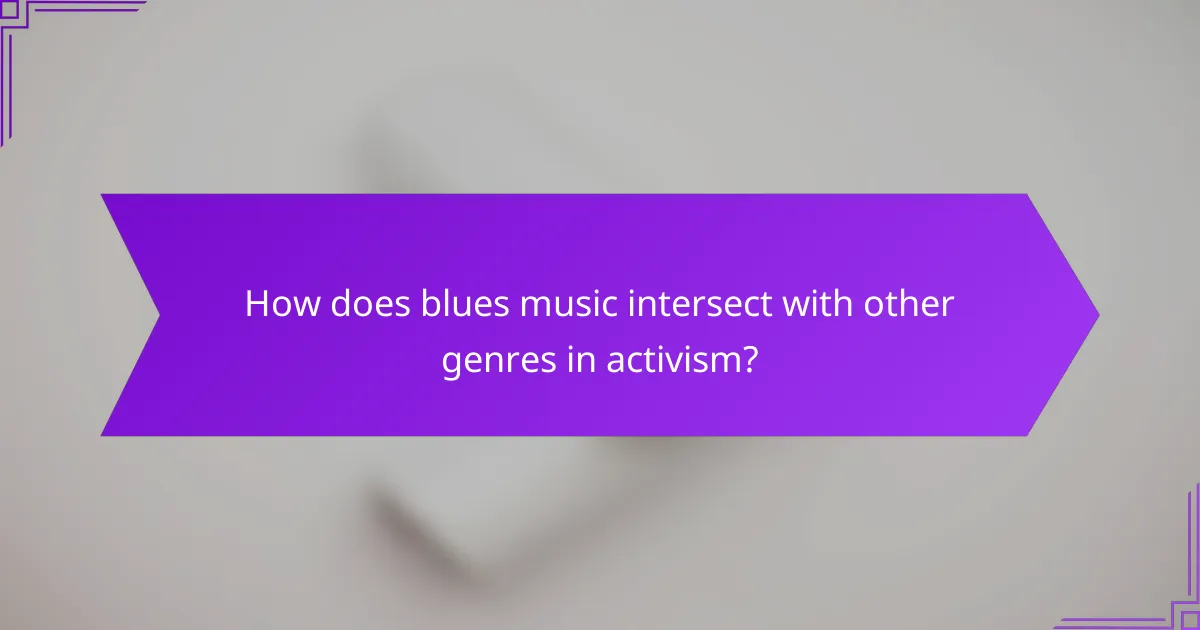
How does blues music intersect with other genres in activism?
Blues music intersects with various genres in activism by serving as a foundational influence that informs the themes and styles of other musical forms. This cross-genre collaboration amplifies messages of social justice and political change, creating a powerful platform for activism.
Collaboration with hip-hop artists
Blues has significantly influenced hip-hop, with many artists incorporating its themes of struggle and resilience into their lyrics. Collaborations often blend traditional blues instrumentation with modern beats, creating a unique sound that resonates with younger audiences. For example, artists like J. Cole and Kendrick Lamar have drawn on blues elements to enhance their storytelling about social issues.
These collaborations not only preserve the legacy of blues but also introduce its messages to new listeners, fostering a dialogue about race, inequality, and justice. The fusion of these genres highlights the ongoing relevance of blues in contemporary activism.
Influence on folk and rock music movements
Blues music has played a crucial role in shaping folk and rock movements, particularly during the 1960s and 1970s. Artists like Bob Dylan and The Rolling Stones drew heavily from blues traditions, using its emotive power to address political and social issues. This influence is evident in songs that tackle themes such as civil rights and anti-war sentiments.
The integration of blues into folk and rock not only broadened its audience but also reinforced the genre’s role as a vehicle for activism. By embracing blues, these movements helped to elevate the conversation around critical societal issues, making them more accessible to a diverse range of listeners.
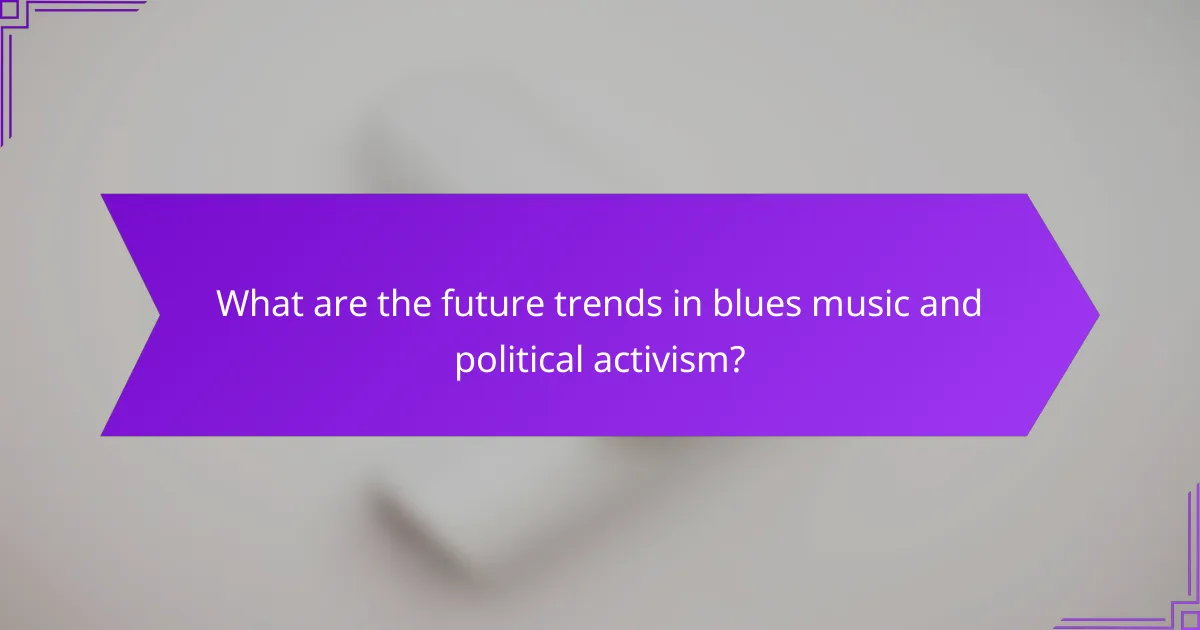
What are the future trends in blues music and political activism?
Future trends in blues music and political activism are increasingly intertwined, with artists using their platforms to address social issues. The rise of digital tools and global connectivity is enabling musicians to amplify their messages and engage with broader audiences.
Emerging digital platforms for activism
Digital platforms such as social media, streaming services, and crowdfunding sites are revolutionizing how blues artists engage in activism. Musicians can share their messages instantly and reach diverse audiences, fostering community support for various causes.
For example, platforms like Instagram and TikTok allow artists to create short, impactful content that highlights social issues, while crowdfunding sites enable them to finance projects that promote change. Artists should consider leveraging these tools to maximize their outreach and impact.
Globalization of blues and its impact on social movements
The globalization of blues music is facilitating cross-cultural collaborations that enhance political activism. As artists from different countries blend traditional blues with local sounds, they create a rich tapestry of music that resonates with various social movements.
This fusion not only broadens the appeal of blues but also allows for the sharing of diverse perspectives on issues like inequality and injustice. Musicians can harness this global influence to unite audiences and inspire collective action, making their activism more potent and far-reaching.

